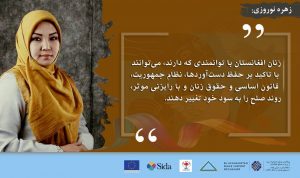Women Can Benefit from Peace Talks

Despite many criticisms on the ability and political affiliation of women negotiating members, some believes that they can well-represent Afghan women in the peace talks.
In interview with CSHRN, Zohrah Nawrozi, a member of parliament, argued that despite having symbolic role, women’s presence in peace negotiations would benefit the wider Afghan women and preserve core values, including human rights, republic system, the constitution, and women human rights.
CSHRN: What are women’s concerns about peace talks?
Zohrah: Women’s main concern is about their social and political rights to be compromised in the talks with the Taliban.
CSHRN: What issues related to women should be further discussed in the negotiations?
Zohrah: Women’s social and political rights must be openly discussed with the Taliban. In remote areas, most people still underestimate women’s ability in carrying out challenging tasks. Due to traditional barriers, women, mainly at the district level, have been kept in the dark side, and less or no chance has been given to them to flourish their talent. Therefore, women related issues must be given a priority during the talks with the Taliban. Afghan women should NOT be dragged back to the 1990s, rather their gains and opportunities must be preserved.
CSHRN: What is your understanding of the outcome of the peace talks?
Zohrah: The outcome of the peace talks largely depends on the government negotiating team’s ability to reap the benefit of the current opportunity in favor of Afghan people. The team should not compromise on the core values Afghan people have achieved such as the constitutional rights.
CSHRN: Are you optimistic about the outcome of the peace talks?
Zohrah: Good management, women’s meaningful participation, and full implementation of the peace agreement will lead to a positive outcome that should also be monitored and guaranteed by the international community, and the parties to the conflict.